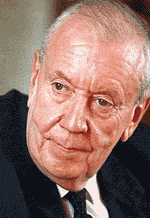|
|
Composer Details
Malcolm Arnold |

|
|
Birthdate
October 21, 1921
Country of origin
Great Britain
Web site
www.musicweb-international.com/arnold/arnold.htm
Biography
Born in Northampton on 21st October 1921, Malcolm Arnold studied composition with Gordon Jacob and trumpet with Ernest Hall at the Royal College of Music. In 1941 he joined the trumpet section of the London Philharmonic Orchestra, becoming principal by 1943. After two years of war service and one season with the BBC Symphony Orchestra he returned to the LPO in 1946; but composition was already becoming his priority and he had already produced a catalogue of attractive works, an early example being the comedy overture Beckus the Dandipratt, Op.5 (1943), recorded in 1948 by the LPO under their principal conductor Eduard van Beinum. That same year Arnold won the Mendelssohn Scholarship which enabled him to spend a year in Italy; on his return he decided to concentrate entirely upon composition. His experience as an orchestral player stood him in good stead as a composer. He quickly built up a reputation as a fluent and versatile composer and a brilliant orchestrator, many commissions were to come his way. Arnold has written works in almost every genre for amateur and professional alike, including nine symphonies, five ballets, two operas, 20 concertos, overtures and orchestral dances, two string quartets and other chamber music, choral music, song cycles and works for wind and brass band. Somehow, in the midst of this prolific creativity, Arnold has found time to score over 80 films including the Academy Award-winning score for Bridge on the River Kwai, written in only ten days and Inn of the Sixth Happiness which brought an Ivor Novello Award. In 1969 Malcolm Arnold was made a Bard of the Cornish Gorseth, he was awarded the C.B.E. in 1970 and received honorary doctorates from the universities of Exeter (1969), Durham (1982) and Leicester (1984). He was made a fellow of the Royal College of Music in 1983 and is an Honorary R.A.M. In 1986 he received the Ivor Novello Award for outstanding services to British music. He was Knighted in 1993. Arnold's music springs directly from roots in dance and song. Typically it is lucid in texture, clear in draftsmanship. His lighter entertainment pieces are easy to listen to and rewarding to perform. As an inventor of tunes, his powers seem to be inexaustible, and he is prodigal with his gifts; the 'big tune' in the modest little Toy Symphony, for example, is just as much a winner as the many memorable themes in many concert works. Many of these are firmly established in the concert repertory. Yet for those who have ears to hear, his works frequently give more than a hint of a complex musical personality and of dramatic tensions not far below the surface. In fact there is scope in Arnold's music which reflects his profound concern with the human predicament and also in his belief that music is "a social act of communication among people, a gesture of friendship, the strongest there is."
Biography by Malcolm Arnold Society
|
 View the filmo/discography of Malcolm Arnold. View the filmo/discography of Malcolm Arnold.
|
Other interesting sites:
 The Malcolm Arnold Society The Malcolm Arnold Society
|
|
|